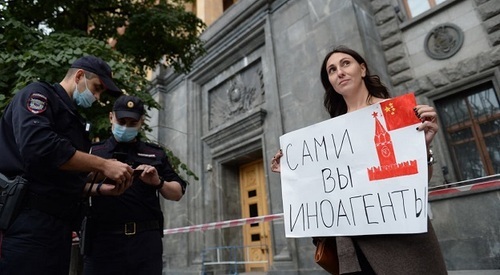
04 February 2022, 13:42
Moscow: debaters criticize laws on foreign agents
On February 3, an expert discussion on the reform of the legislation on foreign agents, organized by the Moscow Helsinki Group (MHG), was held online by using the Zoom platform.
The "Caucasian Knot" has reported that on December 28, 2021, the Supreme Court (SC) of Russia decided to liquidate the "International Memorial"* and its regional branches; and on the following day the Moscow City Court (MCC) ruled to liquidate the Human Rights Centre (HRC) "Memorial"*.
Almost all the debaters believed that the legislation on foreign agents should be cancelled, while one part of them insisted that this should be done immediately, while others regarded that, given the current political situation, the legislation could not be cancelled right now; they proposed some corrective amendments as the first step, the "Caucasian Knot" correspondent reports.
In particular, Grigory Okhotin, the co-founder of the "OVD-Info" Project*, spoke out in favour of the immediate abolition of the legislation on foreign agents. This legislation "causes incredible harm to the state and society"; it drives the civil sector into a "gray zone"; and hundreds of thousands and millions of people are left without legal assistance, he has stated.
The notion of a "foreign agent" is understood by most of the society as a "foreign spy," said Nyuta Federmesser, the founder of the "Vera" Hospice Assistance Charitable Fund, a member of the central headquarters of the All-Russian Popular Front. "This leads to undermining of non-commercial organizations amid the failure of the respective state institutions; this dooms many people to the absence of help," she has stated.
Marina Shishkina, the vice-speaker of the Saint Petersburg Legislative Assembly and a member of the board of the Union of Journalists of Saint Petersburg and the Leningrad Region, believes it unlikely that the legislation will be cancelled in the near future; therefore, she proposes to amend the laws on foreign agents. According to these amendments, the media could be awarded the status of a foreign agent only by the court judgement. At the same time, if a media outlet has received no funding from a foreign source within a year, it should be excluded from the list of foreign agents' while the burden of proving that the medium received foreign funding again falls on the Ministry of Justice, she explained the proposed amendments.
* The organization is included by the Russian Ministry of Justice (MoJ) in the “Register of non-profit organizations performing the functions of a foreign agent”.
This article was originally published on the Russian page of 24/7 Internet agency ‘Caucasian Knot’ on February 4, 2022 at 01:33 am MSK. To access the full text of the article, click here.
Author: Alexander Stepanov Source: CK correspondent




